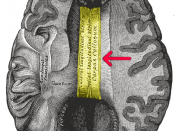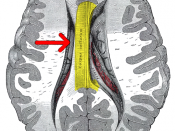Elizabeth Burke
October 8, 2013
Gender Affecting Memory
A great debate in psychology is whether gender affects memory. There has been
a lot of controversy and research conducted to explain the question, does gender affect
memory? After properly reviewing articles about this topic, I have concluded gender
doesn't affect memory but whether how memory is processed. Each gender has their
own advantage when it comes to memory.
Memory is processed differently between males and females. Women have
better long term- episodic memory, while men have better long- term semantic memory.
Due to verbal clues, women are more likely to remember events that are associated
with emotions. These include weddings, birthday parties, or anniversaries. Due to visual
clues, men are more likely to remember functions associated with tactics. These include
traveling, trivia, and direction. For example, a man is more likely to able to find his way
out of a forest than a woman.
The size of the male and female brain differs. In a scan of the female brain, it
was proven the limbic cortices, which regulates emotion, was larger. The limbic cortex
also processes language. Women have neurons that are tightly packed. This allows
faster communications to be made. The connections they make are more complex and
sophisticated. This could explain why woman are better at multi- tasking. The scan
showed the female brain has larger corpus callosum, which is bundle of nerves that
connects emotion and cognition. As a result, women are better with language abilities
rely more heavily on oral or verbal communication. "If a female were to have a stroke in
the left- front side of the brain, she may still retain some language from the right front-
side. The female brain is more diffused and utilizes significant portions of both
hemispheres for a variety of...


